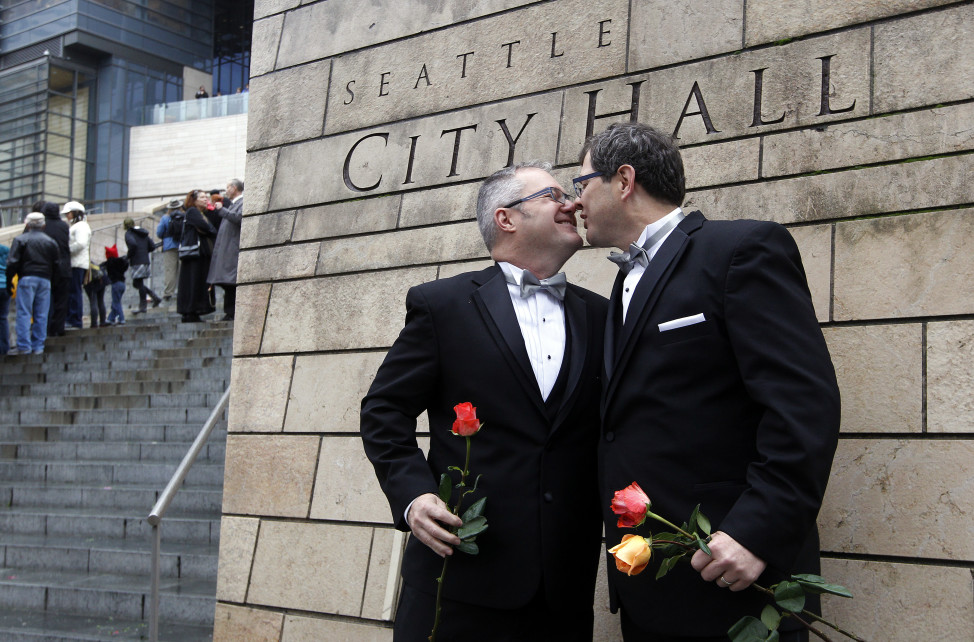
Terry Gilbert, left, kisses his husband Paul Beppler after wedding at Seattle City Hall, becoming among the first gay couples to legally wed in the state, Dec. 9, 2012, in Seattle, Washington. (AP Photo)
Most Americans now back gay marriage, something that was almost unheard of just one generation ago, and that support is even growing among the most conservative young Americans–evangelical Christians.
Among all Americans, 56 percent favor same-sex marriage while 32 percent remain opposed to it, according to the General Social Survey. An analysis of its findings on gay marriage was conducted by The Associated Press-NORC Center for Public Affairs Research and the General Social Survey.
Among white evangelical Protestants, 28 percent favor gay marriage while 66 percent oppose it. However, when you look at young evangelicals–those aged 18 to 34–43 percent support same-sex unions while 54 oppose it, according to the Public Religion Research Institute.
These more tolerant attitudes toward gay marriage are driven by social relationships younger Americans have, says Robert P. Jones, CEO of PRRI.
“They’re more likely, for example, to know someone or have a close friend or family member who is gay or lesbian, and that is a very strong driver of opinion,” Jones said. “Going forward, strong opposition to same-sex marriage, for example, as a driver of the culture war, is something that is destined to lose steam.”
In 1973, 70 percent of people felt same-sex relations are “always wrong,” and in 1987, 75 percent felt the same. By 2000, that number had dropped to 54 percent and by 2010 dipped to 43.5 percent.
This dramatic shift in public opinion is one of the fastest changes ever measured by the General Social Survey, which has been conducted every two years for the past four decades.
While basic demographic realities suggest greater openness is inevitable, changing how younger evangelical Christians interpret the bible is not.
“Many younger evangelicals don’t know what to think theologically on this issue in terms of ‘Is same-sex marriage sinful?’,” said Matthew Vines, author of God and the Gay Christian. “But they are willing to say, ‘In a pluralistic society, I don’t want to be infringing the rights of another group of people, whether I agree with them or not.’”

Matthew Vines at the annual meeting of the National LGBTQ Task Force in Denver, Colorado, Feb. 5, 2015. (AP Photo)
Vines, a self-described gay evangelical Christian, left Harvard University after two years and established The Reformation Project, which uses biblical-based resources to make the religious case for same-sex marriage.
Vines points to six passages in scripture that refer to same-sex behavior in a negative light, which lead many Christians to believe all same-sex relations are prohibited.
“Paul, in the New Testament, is specifically describing same-sex behavior that is short term, that is fleeting, that is motivated by selfish, excessive desires, not loving, long-term faithful relationships,” Vines said.
A handful of evangelical churches in the United States softened their stance on same-sex marriage in the past year, but all lost members and donors as a result.
“There are significant institutional barriers to enduring change within evangelical churches,” Vines said. “This conversation is just getting started in the mainstream of the evangelical world and it will continue but I think it will take at least a decade to really affect a sweeping shift throughout American evangelicalism and even then there will be some more-conservative churches that are still holding out.”
Those still holding out appear to include influential Pastor Rick Warren and a group of Catholic and Evangelical scholars and intellectuals. They reportedly signed an eight-page declaration opposing the growing acceptance of same-sex marriages.
According to The Christian Post, the declaration is scheduled to be published in a religious journal this month and states, “An easy acceptance of divorce damages marriage; widespread cohabitation devalues marriage…But so-called same-sex marriage is a graver threat, because what is now given the name of marriage in law is a parody of marriage.”
Overall, the largest growth in support for gay marriage occurred among Republicans. Almost half, 45 percent, now support same-sex unions. However, Democrats (65 percent) and independents (54 percent) are still more likely than Republicans to support marriage rights for gay and lesbian couples.
When the survey first asked the same question in 1988, support for same-sex marriages was between 1 to 10 percent in all three groups.


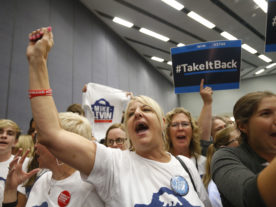


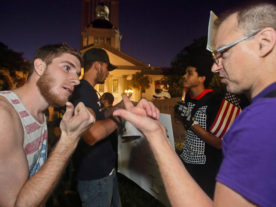


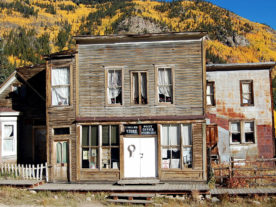
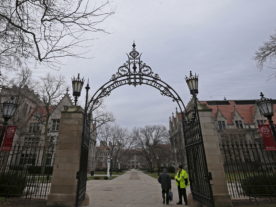

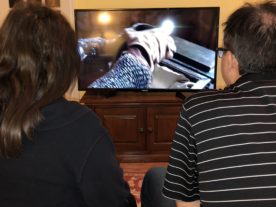





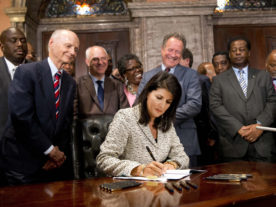

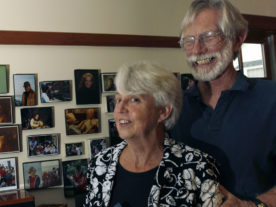


Since Christianity is in question here then let us see what the Bible says:
The Bible consistently tells us that homosexual activity is a sin (Genesis
19:113; Leviticus 18:22; 20:13; Romans 1:2627; 1 Corinthians 6:9). Romans 1:26
27 teaches specifically that homosexuality is a result of denying and disobeying
God. When people continue in sin and unbelief, God “gives them over” to even
more wicked and depraved sin in order to show them the futility and hopelessness
of life apart from God. 1 Corinthians 6:9 proclaims that homosexual “offenders”
will not inherit the kingdom of God.
God does not create a person with homosexual desires. The Bible tells us that
people become homosexuals because of sin (Romans 1:2427) and ultimately
because of their own choice. A person may be born with a greater susceptibility to
homosexuality, just as some people are born with a tendency to violence and other
sins. That does not excuse the person’s choosing to sin by giving in to sinful desires.
If a person is born with a greater susceptibility to anger/rage, does that make it right
for him to give into those desires? Of course not! The same is true with
homosexuality.
However, the Bible does not describe homosexuality as a “greater” sin than any
other. All sin is offensive to God. Homosexuality is just one of the many things
listed in 1 Corinthians 6:910 that will keep a person from the kingdom of God.
According to the Bible, God’s forgiveness is just as available to a homosexual as it
is to an adulterer, idol worshipper, murderer, thief, etc. God also promises the
strength for victory over sin, including homosexuality, to all those who will believe
in Jesus Christ for their salvation (1 Corinthians 6:11; 2 Corinthians 5:17;
Philippians 4:13).
Now that , that has been made clear. Explain to me how a “christian” can be in support of homosexuality?
I agree with you 100%. God bless you my sister.
Clearly this author has not read Vines’ book nor the Bible. Perhaps he cannot write; he certainly can’t spell.
I try not to judge other people but it’s a human trait. It seems to me that these new churches take on their own interpretation of the bible to fit the convenience of their members’ life style for the sake of money. Faith promotes good, not money, not attendance, not reverence nor good works but only by faith and truly being sorry for your sins good will follow. I know not what’s in anyone’s heart so I cannot judge, only God can do that.
Sit down and study your Bible. You sound too superficial.
religion is big business, follow the $
The struggle is at minimum an empirical-factual one. Being gay is NOT an illness, disorder, or malevolent condition, period, empirically speaking. The six to seven decades of published research, following after WW II and on to the present day, clearly disconfirm the legacy disease or personality-behavior problem notions that were so widespread among us at so many different levels. One may still cling to a narrow, closed reading of scriptures which sidesteps or glosses over ….. or even sees fit to ignore? ….. the interpretational problems involved when we simply translate the original text and its ancient near eastern historical-cultural-linguistic contexts into a modernized flat earth notion of ‘homosexual sin.’ But that does not in fact make these heavy-weight considerations irrelevant to ethics and many different, active forms of human conscience. Whether we like it or not, we are increasingly working through these issues, face to face with each other in daily life. Increasingly, as people lead decent lives ….. even excellent or admirable lives? ….. among us so transparently as our family members, friends, co-workers, neighbors and exemplars, we have to ask a question uncannily similar to its New Testament precursor, when Jesus asks, Can a bad tree bear good fruit?
The Bible teaches that adulterers must be stoned to death, and hence married men and married women who had sex outside marriage must be stoned to death just as the Bible teaches that homosexuals must be stoned to death. As a true believer, you must surely obey this. Must the Bible not be interpreted correctly?
The Bible teaches that any person who divorces his wife or her husband has committed adultery and must be stoned to death and hence any Christian who divorces his wife or her husband must be stoned to death just as the Bible teaches that homosexuals must be stoned to death. As a true believer, you must surely obey this. Must the Bible not be interpreted correctly?
The Bible teaches that any bride who is found on the wedding night not to be a virgin must be stoned to death, and hence any Christian bride who previously had sex must be stoned to death just as the Bible teaches that homosexuals must be stoned to death. As a true believer, you must surely obey this. Must the Bible not be interpreted correctly?
The Bible teaches that no women must have authority over men and hence all female pastors and politicians and other women in leadership positions must resign immediately just as the Bible teaches that homosexuals must be stoned to death. As a true believer, you must surely obey this. Must the Bible not be interpreted correctly?
The Bible teaches that any person who works on the Sabbath (between Friday sundown and Saturday sundown) must be stoned to death, and hence any Christian who is found working on Saturdays or the Christian Sunday must be stoned to death just as the Bible teaches that homosexuals must be stoned to death. As a true believer, you must surely obey this. Must the Bible not be interpreted correctly?
The Bible teaches that Jews can have slaves and can enslave the insolvent and prisoners of war and hence any Christian can have slaves and can enslave the poor and other races just as the Bible teaches that homosexuals must be stoned to death. As a true believer, you must surely obey this. Must the Bible not be interpreted correctly?
The Bible teaches that the Amalekites and other racial enemies must be wiped out from the face of the earth and hence Christians must commit genocide by killing all their unbelieving racial enemies just as the Bible teaches that homosexuals must be stoned to death. As a true believer, you must surely obey this. Must the Bible not be interpreted correctly?
The Bible teaches that people who eat lobsters, oysters, crabs or prawns must be ex-communicated, and hence any Christian who eats lobsters, oysters, crabs or prawns must be kicked out of the Church just as the Bible teaches that homosexuals must be stoned to death. As a true believer, you must surely obey this. Must the Bible not be interpreted correctly?
The Bible teaches that people who eat pork or pork sausages must be ex-communicated, and hence any Christian who eats pork or pork sausages must be kicked out of the Church just as the Bible teaches that homosexuals must be stoned to death. As a true believer, you must surely obey this. Must the Bible not be interpreted correctly?
The Bible teaches that any person who charges interest on a loan commits the sin of usury and must be ex-communicated and hence any Christian whose bank deposit is credited with bank interest must be kicked out of the Church just as the Bible teaches that homosexuals must be stoned to death. As a true believer, you must surely obey this. Must the Bible not be interpreted correctly?
The Bible teaches that any Christian who blasphemes or takes the name of God in vain must be stoned to death, and hence any Christian who blasphemes must be stoned to death just as the Bible teaches that homosexuals must be stoned to death. As a true believer, you must surely obey this. Must the Bible not be interpreted correctly?
The Bible teaches that any disobedient insolent children must be stoned to death, and hence disobedient Christian children must be stoned to death just as the Bible teaches that homosexuals must be stoned to death. As a true believer, you must surely obey this. Must the Bible not be interpreted correctly?
Sorry, but you have just exposed your ignorance of the scriptures and the distinctions between the old and new covenants. Sin is sin and it will receive its right wages (death – eternal separation from God) unless it comes under the blood of the new covenant.
Taboos are powerful forces. They last for centuries. It is not a deliberate misreading of Scripture that causes us to read in the divine right of kings or the subservience of women or the appropriateness of slavery. Taboos and cultural norms are so ingrained one simply cannot read the Bible any other way. When, as now, it becomes increasingly apparent how we have blindly read-in our taboo against gay marriage it is not relativism to open our hearts and minds to the truth…quite simply if two mature Christian adults are able to make the commitment to a life-time of fidelity, support and respect that defines Christian marriage it makes no difference whether they are gay or straight. As the Bible says, ‘if then God has given them the same Spirit as we, who are we to hinder God?’
Perhaps some of these “Christians” who condemn homosexuality, ostracize gay people, and seek to deny them equal rights under the law have forgotten some of the teachings of Christ like “Judge not, that ye be not judged” and “And why beholdest thou the mote that is in thy brother’s eye, but considerest not the beam that is in thine own eye?” (Matthew 7:1-3). Or “He that is without sin among you, let him first cast a stone.” (John 8:7). Whether or not the Bible condemns homosexuality is debatable but even if it does, why should that dictate how we treat gay people today? The Bible also says “Slaves, obey your earthly masters with respect and fear, and with sincerity of heart, just as you would obey Christ.” (Ephesians 6:5). Does that mean we should allow slavery? The Bible also says “The women are to keep silent in the churches; for they are not permitted to speak, but are to subject themselves, just as the Law also says” (Corinthians 14:34) and “Wives, be subject to your own husbands, as to the Lord” (Ephesians 5:33). Does that mean women don’t enjoy equal rights to men, either in the church or whether they are married?
America is doom. But God will protect His people. Its gonna be like Noah and the flood and Sodom and Gomorrah.
For those bashing the Bible, remember that the Bible is a series of books covering history, prophecy and poetry over thousands of years. So let’s look at it in context. What is allowed at one point of time may be prohibited at a later time. Why is that? Because if we get away from the “mystical” definitions of “sin” as absolutes we are left with just this one meaning: “Sin” is simply going against God’s wishes when He dictates so.
Having said that, consider that Abraham was married to his sister. Is not incest a sin? Yes, it became sin when God dictated that it was no longer necessary to have incestuous relationships to populate the earth later on under Mosaic law. Not to mention the detrimental effects of persistent in-breeding. The same can be said for all the other supposed inconsistencies mentioned in the above comments. Look at it this way, if an space-alien where to look at an American history book, it would conclude that slavery is fine..after all it is a part of American history. Oh wait…later on on page 235 it says it was abolished. We must look at the Bible in the same way. So to say the Bible says this or that, you must look at it in context. But ultimately what we are concerned with is what Christianity says, and not ancient Jewish laws governing behavior, morality and worship because Christians are not under the old law covenant, but can still benefit from what it has taught us.
Now as for judging…citing scripture is not judging. But as messengers, we are charged with correcting based on God’s Word what many have deemed as correct based on the world.
“2 Timothy 3:16-17
All Scripture is breathed out by God and profitable for teaching, for reproof, for correction, and for training in righteousness, that the man of God may be competent, equipped for every good work.”
“2 Timothy 4:2
Preach the word; be ready in season and out of season; reprove, rebuke, and exhort, with complete patience and teaching.”
So no one is judging anyone here by citing scripture. It is God who judges. But let me ask you this: would you rather be corrected by a small earthly man, or judged by an all powerful God? Once told, once taught, one can no longer claim ignorance.
There are those here who would attempt logical writhing trying to justify homosexuality in the Bible. You can twist and turn it all you want…it is and has never been permitted nor in agreement with God’s order or definition of marriage. You can rewrite and reinterpret but here is the consequence:
“Revelation 22:18-19
For I testify unto every man that heareth the words of the prophecy of this book, If any man shall add unto these things, God shall add unto him the plagues that are written in this book: And if any man shall take away from the words of the book of this prophecy, God shall take away his part out of the book of life, and out of the holy city, and [from] the things which are written in this book.”
Lastly, you must examine your conscience in this matter. Are you trying to find justification for your lifestyle in the scriptures? If so are you then seeking God’s will or your own?
Revelations 20:11-12
Let the evildoer still do evil, and the filthy still be filthy, and the righteous still do right, and the holy still be holy.”
“Behold, I am coming soon, bringing my recompense with me, to repay each one for what he has done. I am the Alpha and the Omega, the first and the last, the beginning and the end.”
Those creatures are below beasts degree ….. They are degrading themselves to a point we cannot classify them as a human being….. Sexual abuse is prevailing in all churches and what is hidden is more then known.
I encourage you all to read about the true path of Allah which is Islam the real religion. Just be fair and read through authenticated websites to discover the truth … This is the only way to save your soul.
The problem with Islam is that Allah condones lying and is also known as a deceiver.
Qur’an 3:54—And they (the unbelievers) planned to deceive, and Allah planned to deceive (the unbelievers), and Allah is the best of deceivers.
Qur’an 7:99—Are they then safe from Allah’s deception? No one feels safe from Allah’s deception except those that shall perish.
Qur’an 8:30—And (remember) when the unbelievers plotted deception against you (O Muhammad), to imprison you, or kill you, or expel you. They plotted deception, but Allah also plotted deception; and Allah is the best of deceivers.
Whereas the Christian God, YHWH is incapable of lying or deception. He is Truth.
The other problem with Islam is that it denies Jesus as Savior.
The Arabic Islamic Inscriptions On The Dome Of The Rock In Jerusalem says:
“…God is only One God. Far be it removed from His transcendent majesty that He should have a son.”
Jesus did not give Christians any other option but to preach that it is only through faith in His sacrificial death on Calvary that we can receive salvation from our sins.
Jesus told him, “I am the way, the truth, and the life. No one can come to the Father except through me.” (John 14: 6)
Curiously though, the only other spiritual being credited with lying and deception in the Bible is Satan. Each Muslim must examine his own conscience and consider the possibility that he is following Satan. And given current events in the middle east, the answer is apparent for the beheading of Christians has long been prophesied..and is coming to pass. Just read the News.
“2 Corinthians 11:14
No wonder, for even Satan disguises himself as an angel of light.”
Firstly the translation is totally is inaccurate and the context is misleading. The original Arabic version doesn’t give this meaning at all. And Islam honored prophet Jesus and his purified mother, unlike the Jews who accused virgin Mary of adultery and such.
Mashallah, it is good to see a Muslim here, Alhamdulillah.
If Islam honors Jesus, then why don’t Muslims listen to his commands?
Or is it that you honor but just DONT believe him?
Even Satan recognizes and “honors” Jesus.
I well know what the Bible says about these issues. Still, I find no reason to treat them badly. God will justly treat them, and US. I left the evangelical churches because of the condemnations and hate speech toward not only the GBLT but also Catholics, Gays, and Muslims. In my time, the evangelicals completely forgot the words and acts of Jesus the Christ, and became as Godless as those they condemn.
And, one can not ignore the advances in research to find not only the causation but a cure also. Knowing what the Bible says, it should provide incentive to learn how to help. I leave you to soak in your vile pool of hatred.
Christianity is an abject lie anyway, so what do the opinions of its adherents matter?
One can’t care much for their argument against homosexuality from ‘tradition’, for Christianity itself is not traditional; paganism stretches back into Western man’s dim past. Christianity is the usurper in that regard.
Neither can one consider Christianity’s claims to morality as anything other than a self-serving lie. There is nothing moral about a faith which embraces a God who dispatched bears to devour forty two children simply for making fun of Elijah’s baldness (2 Kings 2:23-25).
The opinions of Christians and their God is irrelevant and unworthy of consideration. Likewise for Muslims, Jews, and all other devotees of the abominable Abrahamic monotheistic tradition.
As an African christian brought up on a mission station, I am deeply saddened that people claiming to be CHRISTIANS would support same-sex marriages. It is a shame for us christians to support sam-sex marraiges. God forbid!
I am Christian and refuse to engage in the hate talk that so many evangelicals take part in. If you are against gay marriage, then don’t do it. I refuse to be God’s little executioner because mostly those who do that go much further than God would.
When did “hate” become such a bad word?
Is it wrong to hate pain?
Is it wrong to hate injustice?
Is it wrong to hate sin?
Is it wrong to hate lies?
Is it wrong to hate the interpretation of evil as good and good as evil?
Proverbs 6:16-19
There are six things that the Lord hates, seven that are an abomination to him: haughty eyes, a lying tongue, and hands that shed innocent blood, a heart that devises wicked plans, feet that make haste to run to evil, a false witness who breathes out lies, and one who sows discord among brothers.
Christians know about hate. As did Jesus.
Matthew 10:22
And you will be hated by all for my name’s sake. But the one who endures to the end will be saved.